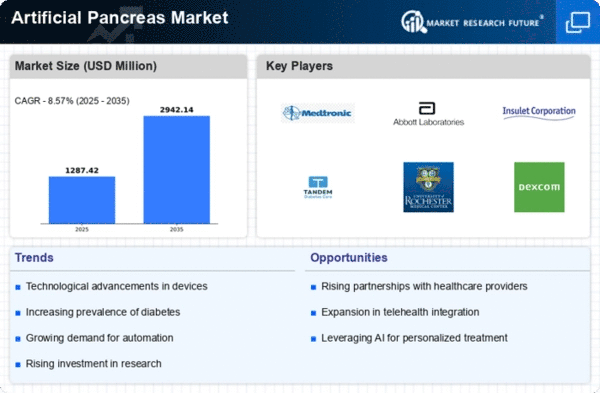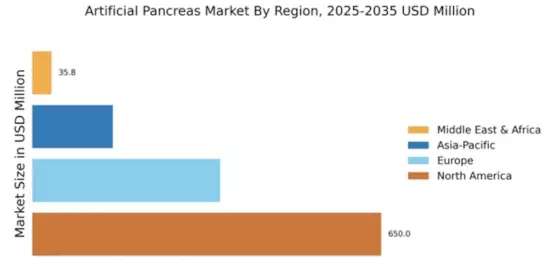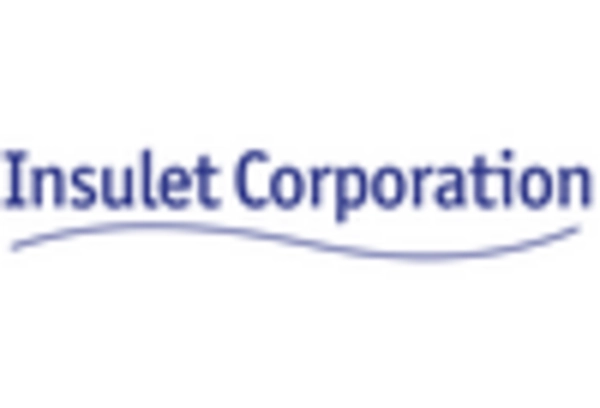Market Growth Projections
The Global Artificial Pancreas Market Industry is projected to experience substantial growth over the next decade. With a market value of 1.43 USD Billion in 2024, it is anticipated to expand significantly, reaching an estimated 6.91 USD Billion by 2035. This growth trajectory reflects a compound annual growth rate (CAGR) of 15.39% from 2025 to 2035. Such projections indicate a strong demand for artificial pancreas systems, driven by factors such as rising diabetes prevalence, technological advancements, and increased investment in diabetes research. The market's expansion is likely to create new opportunities for manufacturers and healthcare providers alike.
Rising Prevalence of Diabetes
The increasing incidence of diabetes globally is a primary driver for the Global Artificial Pancreas Market Industry. As of 2024, the number of individuals diagnosed with diabetes is projected to reach approximately 537 million. This alarming trend underscores the urgent need for innovative management solutions, such as artificial pancreas systems, which can provide more effective glucose control. The demand for these systems is expected to surge as healthcare providers and patients seek advanced technologies to mitigate the complications associated with diabetes. Consequently, the Global Artificial Pancreas Market Industry is poised for substantial growth, with projections indicating a market value of 1.43 USD Billion in 2024.
Growing Awareness and Education
Rising awareness and education regarding diabetes management are pivotal in propelling the Global Artificial Pancreas Market Industry. Healthcare professionals and patients are increasingly informed about the benefits of advanced diabetes technologies, including artificial pancreas systems. Educational campaigns and support groups play a crucial role in disseminating information about these devices, leading to higher adoption rates. As patients become more proactive in managing their diabetes, the demand for effective solutions like artificial pancreas systems is expected to rise. This trend is likely to contribute to the overall growth of the market, as more individuals seek out innovative technologies to enhance their quality of life.
Regulatory Support and Approval
Regulatory support and approval for artificial pancreas systems are critical factors influencing the Global Artificial Pancreas Market Industry. Regulatory bodies are increasingly recognizing the importance of these technologies in improving diabetes management. Streamlined approval processes and favorable regulations are facilitating the introduction of new products into the market. For instance, recent approvals for advanced closed-loop systems have encouraged manufacturers to invest in research and development. This supportive regulatory environment not only enhances market confidence but also stimulates competition among manufacturers, leading to a broader range of options for consumers. As a result, the market is expected to experience robust growth in the coming years.
Increasing Investment in Diabetes Research
The Global Artificial Pancreas Market Industry is benefiting from heightened investment in diabetes research and development. Governments and private organizations are allocating substantial funds to explore innovative solutions for diabetes management. For example, initiatives aimed at developing next-generation artificial pancreas systems are gaining traction, with funding directed towards clinical trials and product development. This influx of capital not only accelerates technological advancements but also fosters collaboration between academia and industry. As a result, the market is likely to witness a surge in new product launches and enhancements, further driving growth. By 2035, the market is anticipated to reach a remarkable value of 6.91 USD Billion.
Technological Advancements in Diabetes Management
Technological innovations in diabetes management are significantly influencing the Global Artificial Pancreas Market Industry. The development of closed-loop systems, which integrate continuous glucose monitoring with insulin delivery, represents a major leap forward. These systems not only enhance patient convenience but also improve glycemic control, reducing the risk of hypoglycemia. For instance, recent advancements have led to devices that can automatically adjust insulin delivery based on real-time glucose levels. As these technologies become more accessible and user-friendly, the market is expected to expand rapidly, with a projected CAGR of 15.39% from 2025 to 2035, reflecting the growing acceptance of artificial pancreas systems.

















